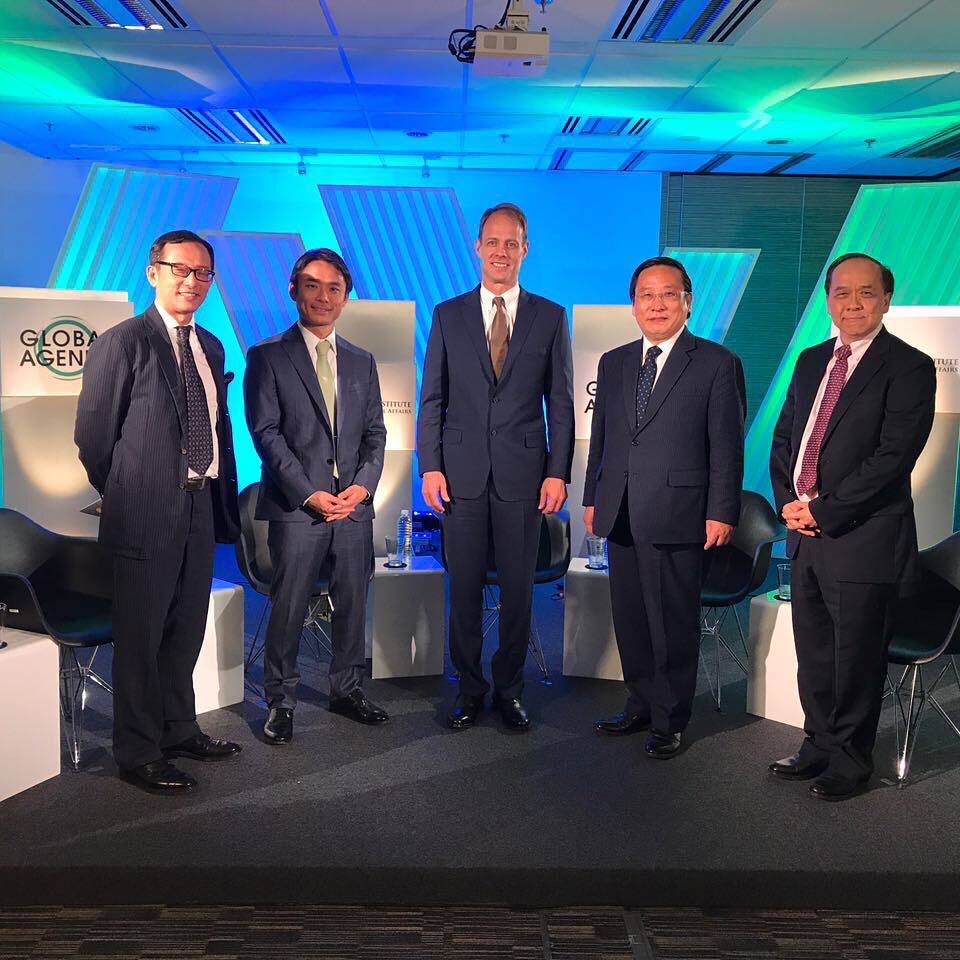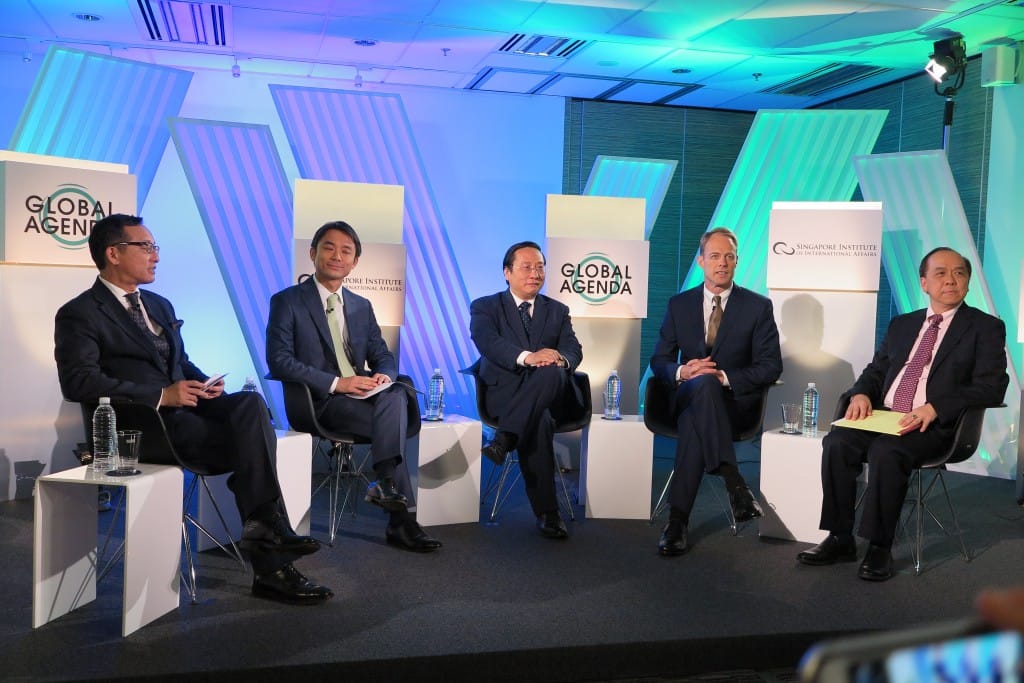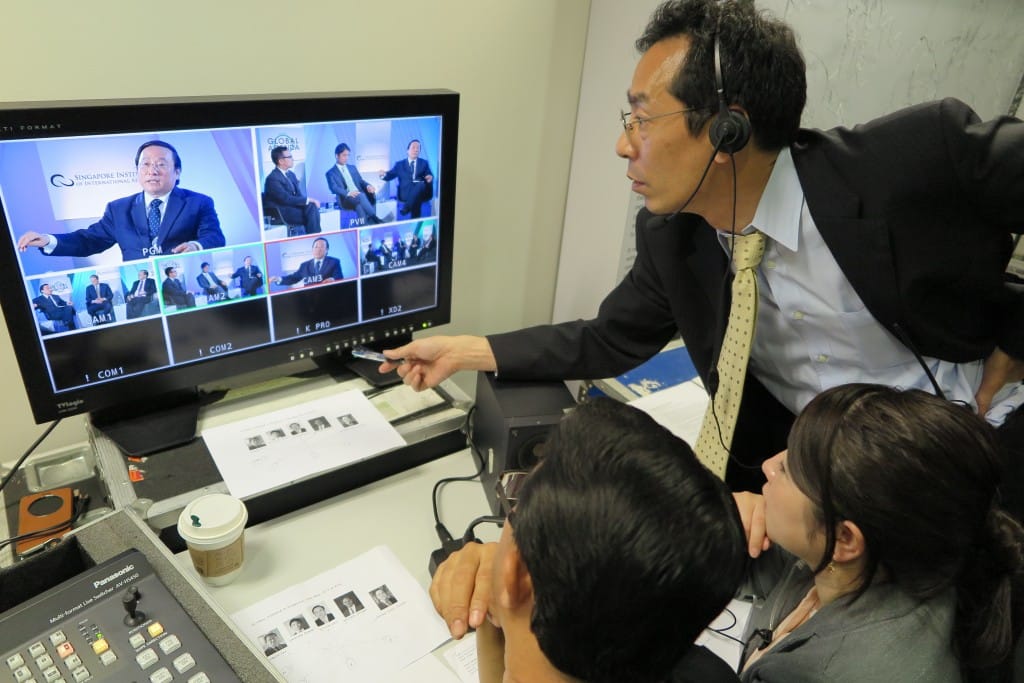What are the prospects for economic growth in Asia? Even as major powers try to cooperate, there is a sense of competition — among the United States, China and also Japan. In collaboration with NHK World, the international service of Japanese broadcaster NHK, we held a panel on Thursday, 18 May, exploring “Asia’s Economic Choices in the New Global Order”. The panel will be broadcast as an episode of NHK World’s monthly “Global Agenda” programme on 10 June.
Here’s a brief taste of what to expect.
More photos from the session are also available on our Facebook.
TPP and Trade
The United States’ decision to withdraw from the Trans-Pacific Partnership (TPP) disappointed many in Asia. However, Mr Daisuke Iwase, Co-Founder and President, Lifenet Insurance Company, noted that from Japan’s perspective the TPP was not an objective in itself but rather “a means to an end”, for instance helping to accelerate domestic reforms in Japan’s agriculture sector and strengthening ties with the US. These objectives are still possible even without the original TPP.
Mr Michael Stumo, Chief Executive Officer, Coalition for a Prosperous America (CPA), said that many in America were happy that President Donald Trump pulled out of the TPP. The US has signed FTAs to improve relations with other countries, but many in the US, particularly in rural areas, have not benefited economically. Mr Stumo also noted that “trade agreements are not equal to trade” – trade between the US and its partners can continue to grow even without multilateral FTAs and globalised rules.
China’s Influence and One Belt, One Road
But even as the US reworks its economic strategy, China is emerging as a champion of globalization and foreign investment. China recently held its inaugural Belt and Road Forum on its “One Belt, One Road” initiative. Dr Victor Gao, Chairman, China Energy Security Institute and Vice Chairman, Sino-Europe United Investment Corporation, said that having emerged from decades of isolation, modern-day China firmly believes in an interconnected world and wants “win-win” relationships with other countries.
Left to right: Prof Tay, Mr Iwase, Dr Gao, Mr Stumo, Prof Khong Yuen Foong, Li Ka Shing Professor of Political Science, Lee Kuan Yew School of Public Policy
A Changing Global Order
Dr Gao insisted that China’s outward-oriented policy is benign, and China does not want to lead other countries. However, Prof Khong Yuen Foong, Li Ka Shing Professor of Political Science, Lee Kuan Yew School of Public Policy, noted that it is only natural for a rising power to want to change some rules and “call more of the shots” – after all, the existing global order was defined by the US.
Quoting the late Singapore Prime Minister Lee Kuan Yew, Prof Khong noted that China may not wish to be the leader, but it does want equality with the US. The question is whether the US can accept this, and whether other Asian states will feel pressure to shift their strategic alignment.
Here in Singapore and Southeast Asia, “we feel the tug of both”, said Prof Simon Tay, Chairman, SIIA, who moderated the session. There are questions about the credibility and durability of US leadership, though to be fair it is still early days for the current administration and much will depend on how President Trump approaches Asia in the months ahead.
For more from the session, including further discussion about the prospects for Sino-US rivalry or cooperation, the diplomatic standoff with North Korea, and other issues, tune in for the June 10 episode of Global Agenda on NHK World. The episode will be available online from June to July. The programme will also be broadcast in Japanese at a later date.
Original Event Synopsis:
Many are now uncertain about the future of Asia’s regional order. There are questions about how US-Asia relations will fare under the Trump administration, especially with China expanding its regional influence. Co-organised with NHK World, we will be holding a discussion on Asia’s economic future, touching on issues such as America’s withdrawal from the Trans-Pacific Partnership (TPP) and the South China Sea.
NHK World is the international service of NHK, Japan’s largest broadcasting organisation and national public broadcaster. This discussion will be broadcast internationally as an episode of NHK World’s Global Agenda series at a later date.
Event Details
Date: Thursday, 18th May 2017
Time: 5:30pm – 7:20pm (Registration at 5:30pm; Talk begins at 6pm)
Venue: Singapore Institute of International Affairs
60A Orchard Road #04-03 (Level 4M) Tower 1
The Atrium @Orchard, International Involvement Hub
Singapore 238890
*Event is by invitation only.
About the Speakers
Mr. Daisuke Iwase
Co-founder and President, Lifenet Insurance Company
Dr. Victor Gao
Chairman, China Energy Security Institute and Vice Chairman, Sino-Europe United Investment Corporation
Mr. Michael Stumo
Chief Executive Officer, Coalition for a Prosperous America (CPA)
Prof. Khong Yuen Foong
Li Ka Shing Professor of Political Science, Lee Kuan Yew School of Public Policy
*Click on speakers’ names to view their full biography.
This event is co-organised with:







